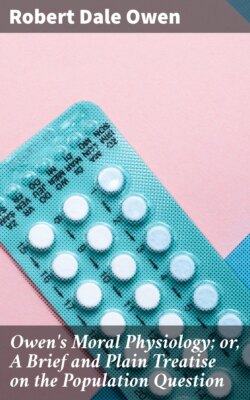Читать книгу Owen's Moral Physiology; or, A Brief and Plain Treatise on the Population Question - Robert Dale Owen - Страница 8
На сайте Литреса книга снята с продажи.
CHAPTER III.
THE QUESTION EXAMINED IN THE ABSTRACT.
ОглавлениеTable of Contents
Is it in itself desirable, that man should obtain control over the instinct of reproduction, so as to determine when its gratification shall produce offspring, and when it shall not?
But that common sense is so scarce an article, and that the various superstitions of the nursery pervade the opinions and cramp the enquiries, even of after life—but for this, the very statement of the question might suffice to obtain for it the assent of every rational being. Nothing so elevates man above the brute creation, as the power he obtains over his instincts. The lower animal follows them blindly, unreflectingly. The serpent gorges himself; the bull fights, even to death, with his rival of the pasture; the dog makes deadly war for a bone. They know nothing of progressive improvement. The elephant or the beaver of the nineteenth century, are just as wise, and no wiser, than the elephant or the beaver of two thousand years ago. Man alone has the power to improve, cultivate, elevate his nature, from generation to generation. He alone can control his instincts by reflection of consequences, and regulate his passions by the precepts of wisdom.
It is strange, that even at this period of the world, we should have to remind each other, that all knowledge of facts is useful; or, at the least, cannot be injurious. The knowledge of some facts may be unimportant; the knowledge of none is mischievous. A human being is a puppet—a slave, if his ignorance is to be the safeguard of his virtue. Nor shall we know where to stop, if we follow up this principle. Shall we give our sons lessons in mechanics? but they may thereby learn to pick locks. Shall we teach them to read? but they may thus obtain access to falsehood and folly. Shall we instruct them in writing? but they may become forgers.
Such, in effect, was the reasoning of men in the dark ages. When Walter Scott puts in the mouth of Lord Douglas, on the discovery of Marmion’s treachery the following exclamation, it is strictly in accordance with the spirit and prevailing opinions of the times:
“A letter forged! Saint Jude to speed!
Did ever knight so foul a deed!
At first in heart it liked me ill,
When the king praised his clerkly skill.
Thanks to Saint Bothan, son of mine,
Save Gawain, ne’er could pen a line:
So swore I, and so swear I still,
Let my boy bishop fret his fill.”
But the days are gone by when ignorance may be the safeguard of virtue. The only rock-foundation for virtue is knowledge. There is no fact, in physics or in morals, that ought to be concealed from the enquiring mind. Let that parent, who thinks to secure his sons’ honesty or his daughters’ innocence, by keeping back from them facts—let that parent know, that he is building up their morality on a sandy foundation. The rains and the floods of the world’s influence shall beat upon that virtue, and great shall be the fall thereof.
If man, then, can obtain control over this most important of instincts, it is, in principle, right that he should know it. If men, after obtaining such knowledge, think fit not to use it; if they deem it nobler and more virtuous, to follow each animal impulse, like the beasts of the field and the fowls of the air, without a thought of its consequences, or an enquiry into its nature—then let them do so. The knowledge that they have the power to act more like rational beings, will not injure, if it fail to benefit them. They are at perfect liberty to set it aside, to neglect it, to forget it, if they can. Only let them show common sense enough to permit that others, who are more slow to incur sacred responsibilities, and more willing to give reason the control of instinct, should obtain the requisite knowledge, and follow out their prudent resolutions.
If this little book were in the hands of every adult in the United States, not one need profit by it, unless he sees fit. Nor will any man admit that he can possibly be injured by it. Oh no. His virtue can bear any quantity of light. But then, his neighbour’s, or his son’s, or his daughter’s!
This would lead me to discuss the social bearings of the question. But, as conceiving it more in order, I shall first speak of it in connexion with political economy.
